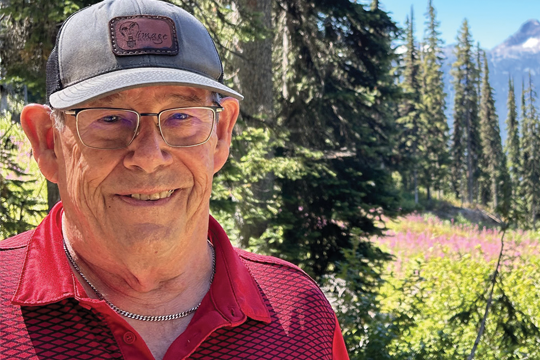
Guy Bird started volunteering with a church youth group at a young age and that spirit of giving of his time continues to this day.
Guy Bird likes people, so much so that he once told his boss at Shell that he would sooner quit than accept a promotion that would have limited his contact with clients.
“I said, ‘What I really liked about the job is dealing with customers and dealing with people,’” he recalls. “And in fact, in that job, I trained five new employees in a row.”
That appetite for being around others and transmitting knowledge is a constant throughout Bird’s personal and professional life. It prompted him to co-start a hockey school for six-year-olds in Saint-Bruno, Que., when the Quebec Junior Hockey Federation decided they were too young to join the league.
“The city gave us two hours’ ice time on a Thursday night,” he says. “They ran a two-line ad in the local weekly paper… and we had 85 kids show up!”
The same love of people took him as far as Indonesia, where he helped mentor public servants for the Canadian International Development Agency.
“I had a wife who was very flexible and ready to go try anything,” Bird says. “She’s actually the one who found that job in the paper — she thought it was working for the Indonesian Embassy in Ottawa.”
Her openness and his willingness to embrace new experiences resulted in a rich career that straddled the private and public sectors.
After studying in New Brunswick, the Montreal native gained experience in finance in several industries, including banking and pulp and paper. One day, a colleague flagged an opportunity at which he thought Bird would thrive: working for the federal government on economic development projects in Indigenous communities. After learning the ins and outs of the job in Nova Scotia, Bird moved to Ottawa in an advising role.
He later specialized in forest products at Industry Canada, an expertise that gave him the chance to spend several years in Brussels, at the Canada Mission to the European Union. That background later made him a designated guide to international visitors.
“Every time there was a foreign delegation, on forestry, I was the one that led them around the country,” he says. “I’ve been back and forth across Canada I don’t know how many times.”
Bird retired from the federal government on Jan. 15, 2001, only to start a contract in Indonesia two days later.
When he retired for good and moved to the Okanagan in British Columbia in 2002, it didn’t take him long to become an active member of Federal Retirees. After all, he has been volunteering his whole life, starting with a church youth group.
Over the years, Bird coached hockey and softball, ran a community association in Ottawa, and even got involved with the Barbershop Harmony Society. At Federal Retirees, he’s had several roles, including branch president and director for British Columbia and Yukon District on the national board.
He stepped down as director to become his wife’s primary caregiver after she was diagnosed with Alzheimer’s disease. He also started volunteering for the Alzheimer’s Society, a commitment that has continued since his wife’s death.
That’s in addition to his current role as president of Federal Retirees Central Okanagan branch. Staying in touch with the 1,500 members throughout the pandemic, organizing “learning experiences” and collaborating with a research cluster on aging have kept him busy. That’s how he likes it.
“You’ve got two choices: you can sit and wait for the grass to grow, or you can plant some seeds and pour water on it, see if you can make it grow,” he says. “I’d rather do that.”

